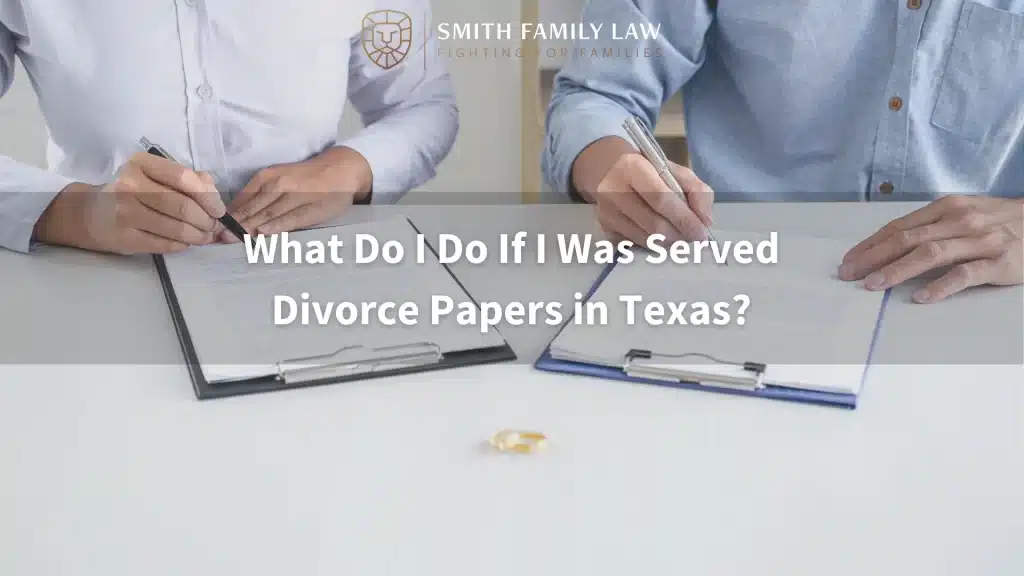
Getting served with divorce papers in Texas can be overwhelming and stressful. It’s common to have many questions about what to do next, what the papers mean, and how the process works from here. Whether you saw this coming or it was a surprise, it’s essential to be informed and prepared. Here’s what you need to know about the basics of being served, the timeline to respond, and how a Texas divorce lawyer can help.
How Are Divorce Papers Served in Texas?
When someone files for divorce in Texas, they begin by filing a petition with the court. In their petition, they must outline their reasons for wanting the divorce and any requests or demands they have. After they file this petition, they must inform the other spouse. This is done through “service of process.”
Someone is officially aware of a lawsuit or legal action against them when a process server delivers legal documents to them. It ensures that everyone involved in a lawsuit is aware of it and has a chance to respond or defend themselves. In the context of a divorce, the service of process informs the other spouse about the divorce action and provides them with the necessary papers, which include the following:
- A Copy of the Original Petition for Divorce: This paper outlines the initiating spouse’s reasons for seeking the divorce and any relevant demands, like child custody or property division.
- A Citation: This is a legal notice that tells the recipient they are being sued for divorce and outlines a specific time frame for them to respond.
In Texas, service of process can occur in several ways, including personal delivery by a process server or sheriff or through certified mail. The goal is to make sure the receiving party gets the documents and knows they need to take action.
How Long After Being Served Divorce Papers Do You Have to Respond?
After receiving divorce papers in Texas, you must act quickly to preserve your rights. You have 20 days plus the following Monday to respond. This means once the 20 days go by, your response is due by 10:00 a.m. on the Monday after the 20th day. If you let this time pass without responding, you risk the court moving forward without your input.
If you don’t agree with one or more of the claims in the Original Petition for Divorce, you have the option to file a counter-petition. A counter-petition lets you present your side of the story and what you want from the divorce. This step is vital if you wish to contest the divorce or disagree about issues like child custody, property division, or spousal support.
If you choose not to respond within the time frame or you simply forget, the court might issue a default judgment. This means granting the divorce based on your spouse’s requests without considering your wishes or concerns. If you’re unsure about how to respond, consult a lawyer for reliable legal advice.
What to Expect After You Respond to Service of Process for Divorce in Texas
The moment you file your response to divorce papers in Texas, the court can begin processing your case. If you’ve filed a counter-petition, your spouse gets a copy and has a chance to reply. Next, both parties must complete initial or mandatory disclosures. This requires each side to provide the other with basic information, usually about finances, property, debts, and other relevant issues.
In some cases, mediation follows these disclosures. In mediation, a neutral third party helps both sides try to reach an agreement on contested issues. Mediation aims to resolve disputes outside of court, saving all parties time and money. However, if mediation doesn’t work, the case will proceed to trial. At trial, a judge will make decisions on all unresolved issues before finalizing the divorce.
Remember to stay in touch with your lawyer throughout this process. They will guide you, represent your interests, and help you understand what to expect at each step.
How to Find Out If Someone Is Trying to Serve You Divorce Papers in Texas
If you suspect someone is trying to serve you divorce papers in Texas, you can take proactive steps to find out. First, check your mail regularly, as some divorce papers come through certified mail. Also, ask family members or roommates if anyone has tried to deliver documents to them on your behalf.
You can also contact the district clerk’s office in the county where you think your spouse might have filed for divorce. They can tell you if there’s a case in your name. If there is, they can provide details on the documents and tell you how to obtain copies.
Keep in mind that avoiding service doesn’t stop the divorce process. If the person filing for divorce can prove that they made reasonable attempts to serve you but couldn’t, the court might allow alternative service methods or even proceed without you.
Do You Need a Lawyer If You’ve Been Served Divorce Papers in Texas?

- Reviewing the divorce papers and explaining your options for responding
- Preparing and filing a counter-petition on your behalf if necessary
- Representing you during court appearances
- Guiding you through the initial disclosure process
- Negotiating on your behalf during mediation sessions
- Preparing you for depositions or testimonies
- Researching relevant laws and cases to support your position
- Drafting motions or requests to the court
- Collecting evidence to support your claims
Served with Divorce Papers in Texas? Contact a Local Divorce Attorney Now
If you’ve been served with divorce papers in Texas and need clear, straightforward advice, look no further than Smith & Bledsoe Family Law. No matter what challenges come your way, a family law attorney is here to support you every step of the journey. Contact our firm online today or call us at (512) 277-3166 for a free case evaluation, and let our team stand by your side.
Related Reading: